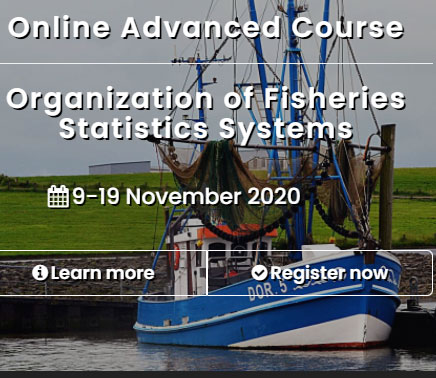 Timely, reliable and comprehensive statistics are required for the effective monitoring and management of sustainable capture fisheries. To respond to this need, the Statistics and Information Branch of the FAO Fisheries Division has organized the online advanced course on Organization of Fisheries Statistics Systems (9-19 November 2020), in collaboration with the International Centre for Advanced Mediterranean Agronomic Studies (CIHEAM), and through the Mediterranean Agronomic Institute of Zaragoza (IAMZ). Deadline for applications is 1 October 2020.
Timely, reliable and comprehensive statistics are required for the effective monitoring and management of sustainable capture fisheries. To respond to this need, the Statistics and Information Branch of the FAO Fisheries Division has organized the online advanced course on Organization of Fisheries Statistics Systems (9-19 November 2020), in collaboration with the International Centre for Advanced Mediterranean Agronomic Studies (CIHEAM), and through the Mediterranean Agronomic Institute of Zaragoza (IAMZ). Deadline for applications is 1 October 2020.
The course is targeted at fisheries managers, statisticians and researchers with responsibilities in fisheries data collection and the design, production and use of fisheries statistics in order to help them to design, plan and implement effective fisheries data collection programmes. The course covers topics going from the definition of the needs for statistics in support to fisheries management; the types of required data and collection systems; and the implementation of robust fisheries statistics and management information systems
The course will be offered online, in English, French and Spanish with simultaneous translation, with live streaming lectures, from FAO, the General Fisheries Commission for the Mediterranean (GFCM), Eurostat, the International Commission for the Conservation of Atlantic Tunas (ICCAT) and other national institutions.
For more information about the course, including registration details, please refer at http://edu.iamz.ciheam.org/FisheriesStatistics/en/
Valutazione articolo: Nessuna